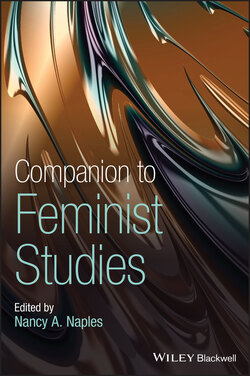Читать книгу Companion to Feminist Studies - Группа авторов - Страница 41
Affective Economies, Anticapitalism, and Anticolonialism
ОглавлениеAs economic relations and as embodied cultural logics, these forces affect women differentially between and within genders, on the basis of race, ableism, caste, and citizenship‐status. Affective economies include the shadow work, of deference, and the emotion work, of affection, in waged reproductive work and sex work (Boris and Parrenas 2010; Hochschild 1983). It also includes emotion and the erotic as necessary resources to reproduce resistance to capitalist regulation (Lorde 1984). Affective necessary labor, as Rosemary Hennessy writes, “permeates the circuit of nature‐bodies‐labor through which needs are met and social life is reproduced” (Hennessy 2013, p. 66).
Queer theories of sexuality raise possibilities for explicitly anticapitalist politics of embodiment and social organization that refuse normative social forms of belonging and desire (Ahmed 2006; Pitts‐Taylor 2016; Povinelli 2011). Roderick Ferguson, in his definition of queer of color critique, emphasizes its recognition of the displacement of normative regimes of gender and sexuality under capitalism, even as they are systemically co‐constituted. “As capital disrupts social hierarchies in the production of surplus labor, it disrupts gender ideals and sexual norms that are indices of racial difference” (Ferguson 2004, p. 17). Marxist feminists theorize how dominant regimes of gender alongside embodiment, ability, and disability are enforced through laws and prison (Ahrens 2008; Gilmore 2007; Spade 2011). Yet these differential theories of embodiment challenge the state and industries that profit from oppressive regimes of nationality, race, class, and gender. Anti‐racist transformations of reproductive technologies and sex practices seek to dismantle reproduction as the critical site for the replenishment of capitalist profit (Briggs 2017; Roberts 1997; Willey 2016).
Current Marxist feminist debates question “reproduction” as configured by relations of life‐being under capitalism; what Melissa Cooper calls Life as Surplus (Cooper 2008). The embodied, affective, and material sites of life‐being demand attention to interspecies coalitions and planetary values of existence (Hawthorne 2002). As Marxist feminists assail the environmental plunder of capitalism, as intrinsic to its ongoing primitive accumulation, they seek answers outside global commodity exchange (Tsing 2005). They theorize an alternative ecologically synergistic economy led by reproductive workers in their greatest numbers, including domestic and care laborers, peasant farmers, and indigenous hunters‐gatherers (Salleh 2011).
Anticolonial women's movements, from Sri Lanka to South Africa, developed nuanced revolutionary strategies to organize women against imperialism (Jayawardena 1986; Mohanty 2003). In India during the 1900s, women like Kumari Kumudini Mitra advocated revolutionary terrorism against British colonial occupation (Bhattacharya and Sen 2003). These struggles solidified into anti‐imperialist fights that sought more than the end of colonialism, but the end of global economic expansion on the backs of workers across the world. In Africa, the Caribbean, Latin America, and Asia, anti‐imperialist women organized rural women alongside informal women workers in cities to join the struggle against capitalism (Chakravartty 2011). They fought for reforms such as universal human rights, against Euro‐American, white supremacist assumptions about differential humanness. They sought leadership by rural women for a renewed revolutionary movement that joined women and men around the world at the forefront of anti‐capitalism (Armstrong 2016).
The anticolonial women's movement developed a praxis that linked imperial wars overseas, particularly in Asia and Africa in the early to mid‐twentieth century, directly to the women of imperial countries. Women like Cai Chang, a founding member of the All China Women's Federation in 1948, and Baya Allouchiche of the Algerian Women's Union pushed for a praxis of anti‐imperialist relationality (Wang 2017). In the mid‐twentieth century, the anticolonial praxis against imperialism sought global campaigns of socialist feminists and all other women that supported armed resistance to occupation as well as direct action to stop colonial militarism. Socialist feminists from colonized and newly independent nations as well as the socialist states of the USSR and East Europe sought to use the United Nations to confront women's commitment to peace in the face of colonial occupation and wars of aggression against liberation movements (Antrobus 2004; Jain 2005; Pietila and Vickers 1990).
